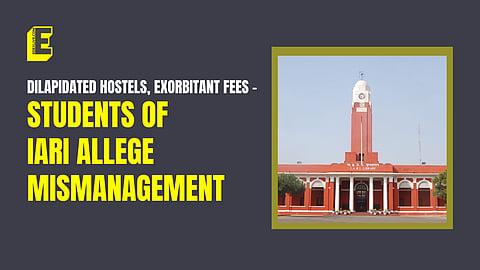

Students of the Indian Agricultural Research Institute (IARI), New Delhi are alleging several administrative lapses in the functioning of the institute, which has made the academic and student life on campus difficult.
In a press statement issued today, September 24, the students highlight several policies and issues that point to a systemic, administrative failure to ensure that daily life on campus goes smoothly.
These issues include a dilapidated campus, a plan to centralise the student mess for profits, a precarious biometric attendance system — and to top it all — mounting tuition and hostel fees.
IRAI was the epicentre of the Green Revolution in the 1960s and is considered a premier institute for agriculture research in India. However, these issues paint a worrisome picture of a prestigious institute in decline, students say.
“This downfall started 10 years ago, and was accelerated in the last five years,” says a student of the institute, on the condition of anonymity.
Shedding light on the condition of the hostel building, the student calls them “unlivable”, and says that the hostels are near-crumbling.
“There have been occasions where tiles fell off the roof, putting residents’ lives in danger,” he says. He adds that a ceiling fan collapsed in a new hostel building because of poor construction.
The hostel bathrooms also do not have proper taps or water heaters, he further reveals. However, the administration would never get the taps fixed or install water heaters in the bathrooms, despite repeated requests, he says, adding that they would instead blame the students for not maintaining the taps properly.
Moreover, he adds that the bathrooms are also not cleaned properly using detergent.
As a result, the students call for the reduction of the tenure of the Master of Halls and Residents (MoHR), who is responsible for the management of the hostels. According to them, the current MoHR has been occupying the post for the last 13 years, while simultaneously holding the position of a professor.
The students also accuse the administration of trying to introduce a centralised mess system and give tenders to third-party caterers, in a bid to make a profit.
“All these years, we have had a student-run, cooperative mess model, where we accommodate the dietary and food preferences of people from across the country. The centralised mess model that the administration wants to introduce is not sustainable in comparison at all,” the student says.
The students also pointed out how the Biometric Attendance policy and the two-wheeler ban policy hinder their mobility and research schedules on campus.
“MSc and PhD students have a dynamic and unspecified daily schedule, as sometimes their research compels them to stay in the laboratories for long hours. However, the biometric system only marks your attendance at a fixed time during the day, and we would not be able to clock in our attendance as a result,” says the student.
He also adds that the students fear that their biometric data is susceptible to breaches or leaks.
As for the two-wheeler ban, the student says that the institute has prohibited students from using their two-wheelers to implement a “green campus”, where only e-bikes are used.
However, this diktat is only applicable to the students and not to the scientists or staff on the campus. Moreover, the campus also does not have any form of e-mobility infrastructure, which means that the students have no choice but to rely on their two-wheelers.
The most pressing issue for the students is the arbitrary and sudden fee hikes every year.
Last year, students of the institute staged a protest after there was a 200 per cent hike in the hostel fees, which was increased to Rs 96,000. Following the protests, the fees were brought down to Rs 10,000.
However, the fees were increased this year yet again, to Rs 76,000 — without any prior consultation with the students.
“No deemed university run by the Central Government has tuition and hostel fees less than Rs 10,000. However, the administration has been irrationally increasing the fees. We are all middle-class students, how would we be able to pay such hefty fees?” the student laments.
He adds that the Post Graduate School Student Union tried to bring these concerns to the institute authorities repeatedly — but in vain.
“If our demands are not heeded, we have no choice but to launch a protest again,” the student says.
